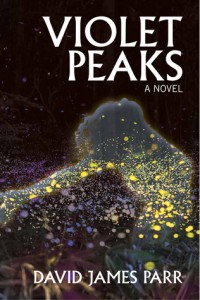In the novel Violet Peaks, author David James Parr tells the story of a person with an overactive imagination struggling to find meaning in their life.
Throughout the course of the book, we watch the titular protagonist grow from a child into an adult – and beyond. Violet finds herself the unwitting captain of her own life, and is constantly amazed to find life’s regular challenges both mundane and incredibly daunting at the same time. Her singular mission is merely to understand who she is – to be able to define herself – and, as Parr shows us, that can be a lot harder than it sounds….
Violet Peaks is a quick and thought-provoking read, and it’s very well-written.
Parr’s style is measured and elegant, yet deeply personal, and an acute brilliance lies in his minuscule details.
The pages of this book are dripping with similes, but it’s in his metaphors where Parr really shines.
One technically impressive feat is what Parr does with time. In a fleetingly smooth paragraph, Parr might walk us through years. A throwaway line might traverse a generation. All the while, the lens of Parr’s narration lends color and weight to it, and transitions both before and after are so smoothly executed that it took me half the book to even realize what he was doing.
Parr gets away with this because instead of tracking events chronologically, he uses emotion as his measure. It ends up effecting the same conclusion, but the journey is different.
Violet suffers from a malaise of Weltschmerz, presumable brought on (or at least worsened) by being an artist without a genuine outlet. This is an intriguing central conflict for a novel, and one which Parr exploits to great effect. While the physical stakes are generally quite low, the spiritual and emotional stakes are life and death.
Most of Violet’s foibles are the result of her searching for meaning in her life almost exclusively through romantic love and sexual conquests. While the feminist within you may cringe at some of her choices, I urge you to hold on until the end.
In many chapters, Parr makes use of repeating choruses, and in some cases it works better than others. As they teach in acting and singing: if you’re going to say the same thing twice, it better not be the same thing twice.
All told, Violet Peaks is a joy to read, and the glimpse into Parr’s worldview is a mind-expanding breath of fresh air.
